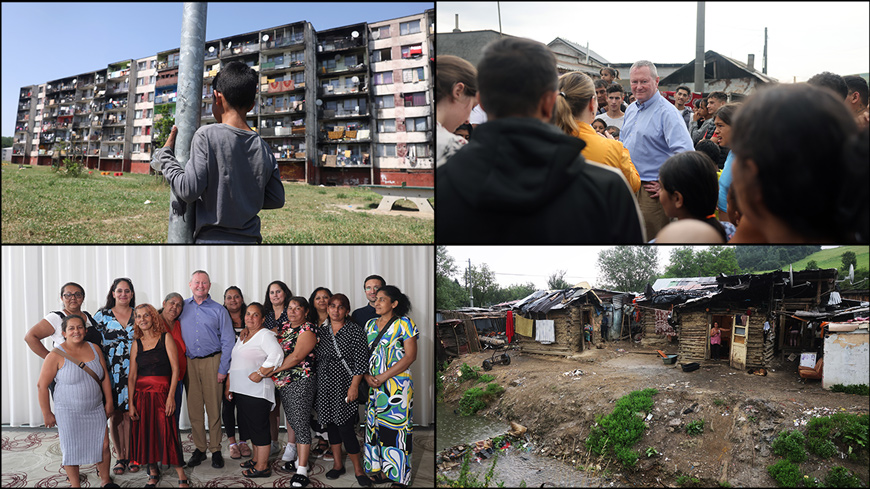The Council of Europe Commissioner for Human Rights, Michael O’Flaherty, calls for emergency interventions to address the dreadful housing conditions of thousands of Roma, following his visit to the Slovak Republic from 8 to 12 July. The Commissioner engaged extensively with Roma communities to better understand their lived experiences. He also addressed other human rights concerns in the country, especially regarding media freedom and pressures experienced by civil society.
“As elsewhere, prejudice against Roma is deeply rooted in society. Discrimination affects all areas of Roma people’s lives in the Slovak Republic: from Roma women being placed in separate maternity wards to Roma children being segregated in education. Many Roma are deprived of access to adequate housing and are turned away from job interviews”, the Commissioner stated.
Some Roma communities live in extreme poverty, making their lives a constant struggle for survival. In certain of the locations visited by the Commissioner, there is no or very limited access to water, sanitation and electricity. Some Roma dwellings are totally unfit for human habitation and located in hazardous locations, at risk of flooding or near toxic waste dumps. Ambulance services are reported to sometimes avoid Roma settlements even in emergency situations. “In some of the areas I visited, standing up for the human rights of Roma is literally a matter of life and death”, said the Commissioner.
However, the Commissioner praised initiatives empowering Roma, building bridges between marginalised Roma communities and public health and other services, and promoting innovative approaches like microcredits for housing and projects related to early childhood development. “Such activities, often driven by civil society, must be supported as they have the potential to break the cycle of marginalisation and social exclusion across generations, especially if they put Roma women at their heart. I believe that Roma women can be the vectors of change,” the Commissioner said.
Long-term engagement is essential. While limited duration projects may have valuable, immediate impact on the lives of Roma, the scale of the human rights challenge calls for a radical shift. “We need an intergenerational approach to tackling the challenges so many Roma face,” the Commissioner highlighted. “This also means fundamentally rethinking the funding structures to ensure long-term sustainability of good initiatives.”
While it will take years, possibly decades, to tackle many of the challenges, others could be solved quickly. Addressing the plight of Roma women who were forcibly sterilised is one such issue. After many decades, Roma women continue to suffer the physical, mental and social impact of these acts. “The government must not wait any longer to heal the ongoing wounds. It must deliver justice, including by setting up an accessible and effective compensation mechanism”, stated the Commissioner, after meeting with several of the victims.
The Commissioner also addressed the need to tackle the widespread antigypsyism, to improve mutual trust of the Roma communities and law enforcement, and to ensure independent investigations into allegations of ill-treatment by the police, in line with the case law of the European Court of Human Rights.
The Commissioner also took the opportunity to follow up on his earlier letter, in which he addressed legislation on NGO registration and on the public broadcaster. He expressed his regret that the act on replacing public broadcaster RTVS with a new entity had been adopted despite his concerns about the human rights implications of this step. He emphasised that the still-pending bill on NGO registration should fully conform to human rights standards. “During my visit, I could see that both independent media and civil society are under a disconcerting level of pressure in the Slovak Republic, in an atmosphere of declining tolerance of diverse viewpoints. The authorities have the responsibility to ensure that media and civil society can work freely and safely. The government should combat the growing hostility towards them in public discourse, including by actively fighting disinformation”, said the Commissioner.
In his meetings with government representatives, the Commissioner condemned the assassination attempt against Prime Minister Robert Fico of 15 May 2024, wished him a full recovery, and stressed the complete unacceptability of any kind of politically motivated violence in democratic societies.
This was the first of a series of country visits as part of the Commissioner’s priority work on the human rights of Roma and Travellers across Europe. During his visit, the Commissioner travelled to Eastern Slovakia and went to the Stará Tehelňa neighbourhood in Prešov, Jarovnice, Petrovany, the Luník IX neighbourhood in Košice, and Kecerovce. There, he met with Roma communities, local authorities, and those who work with Roma, including Health Regions and different civil society organisations. In Bratislava, he met with the State Secretary of the Ministry of Justice, Ms Katarína Roskoványi, the State Secretary of the Ministry of Health, Mr Ladislav Slobodník, the State Secretary of the Ministry of Interior, Ms Lucia Kurilovská, the Government Plenipotentiary for the Development of Civil Society, Ms Simona Zacharová, and the Government Plenipotentiary for Roma Communities, Mr Alexander Daško. He also held meetings with the Public Defender of Rights, Mr Róbert Dobrovodský, and with the Slovak National Centre for Human Rights. He discussed pressures on civil society with multiple organisations working on human rights issues, and media freedom with the Investigative Centre of Ján Kuciak and Reporters Without Borders.



